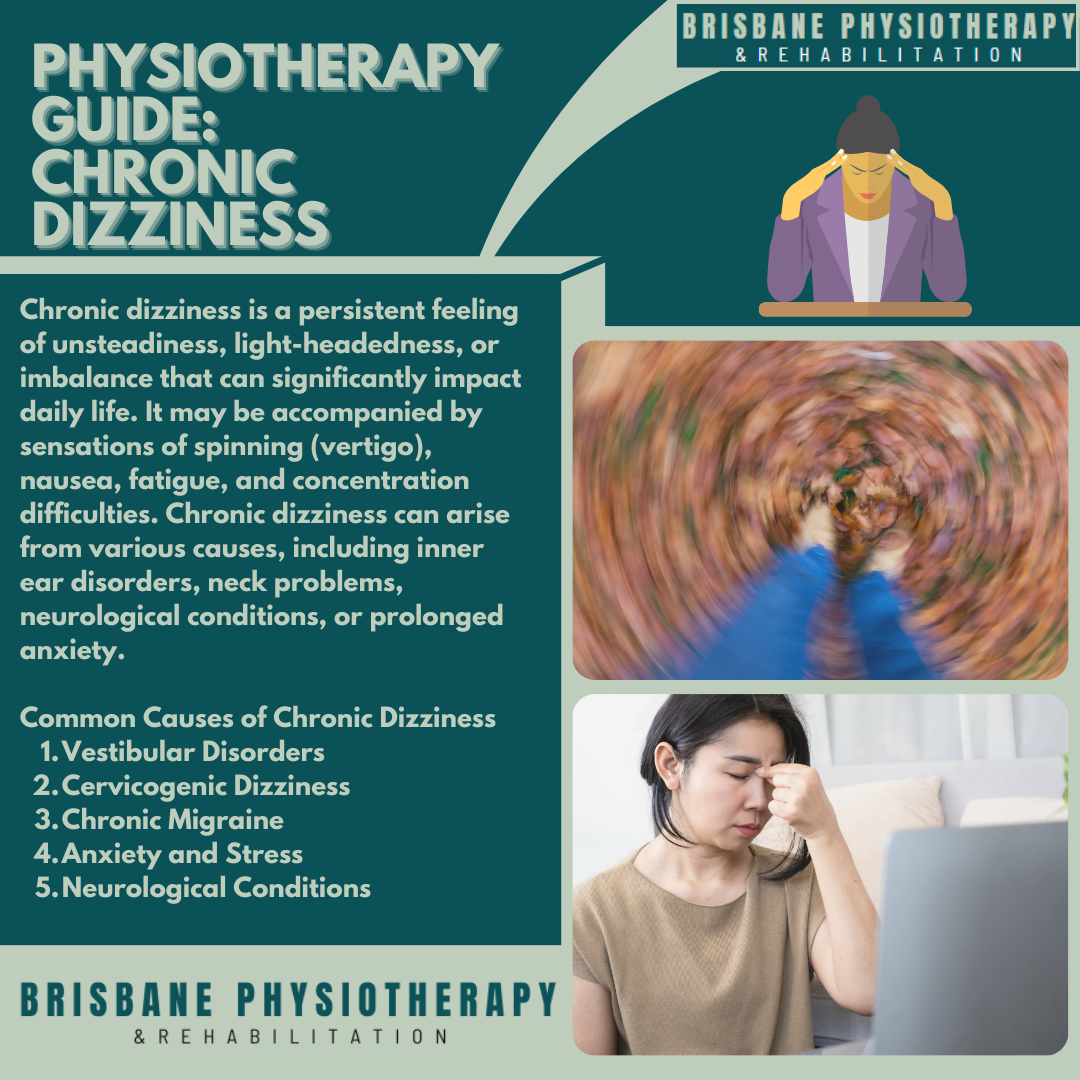Physiotherapy Guide: Chronic Dizziness
Chronic Dizziness: Understanding the Causes and How Physiotherapy Can Help
Chronic dizziness is a persistent feeling of unsteadiness, light-headedness, or imbalance that can significantly impact daily life. It may be accompanied by sensations of spinning (vertigo), nausea, fatigue, and concentration difficulties. Chronic dizziness can arise from various causes, including inner ear disorders, neck problems, neurological conditions, or prolonged anxiety. At Brisbane Physiotherapy, we provide expert assessment and tailored treatment plans to help alleviate symptoms and improve quality of life for those experiencing chronic dizziness.
Common Causes of Chronic Dizziness
Chronic dizziness can stem from a variety of conditions, including:
Vestibular Disorders: Conditions affecting the inner ear, such as Benign Paroxysmal Positional Vertigo (BPPV), vestibular neuritis, and Meniere’s disease, are common causes of dizziness and imbalance. The vestibular system plays a key role in maintaining balance, and any disruption can lead to persistent symptoms.
Cervicogenic Dizziness: This form of dizziness is associated with neck problems, such as whiplash or cervical spine degeneration. Poor posture or muscle tension in the neck can interfere with signals from the neck’s joints and muscles to the brain, resulting in dizziness.
Chronic Migraine: Some people with migraine experience vestibular symptoms like dizziness, even without the presence of a headache. This is known as vestibular migraine.
Anxiety and Stress: Emotional and psychological factors can also contribute to dizziness. Anxiety can cause hyperventilation and increased muscle tension, leading to light-headedness or a sensation of imbalance.
Neurological Conditions: Rarely, chronic dizziness may result from neurological conditions such as multiple sclerosis or Parkinson’s disease.
How Physiotherapy Can Help Manage Chronic Dizziness
Physiotherapy offers effective treatments for managing dizziness by addressing its root cause and helping to restore balance. At Brisbane Physiotherapy, we employ a range of approaches, including:
Vestibular Rehabilitation Therapy (VRT): VRT involves exercises designed to retrain the brain to compensate for balance disturbances. This may include gaze stabilisation, balance training, and habituation exercises to reduce dizziness and improve stability.
Manual Therapy for Cervicogenic Dizziness: If dizziness is linked to neck issues, physiotherapy techniques such as gentle mobilisation, soft tissue massage, and exercises to improve posture can alleviate symptoms.
Graduated Activity Programs: For individuals experiencing dizziness due to deconditioning or anxiety, a structured exercise program can help improve overall fitness, reduce anxiety-related symptoms, and enhance balance.
Education and Self-Management Strategies: We provide advice on lifestyle changes, activity modification, and techniques to manage dizziness triggers, helping you regain control over your symptoms.
Why Choose Brisbane Physiotherapy?
At Brisbane Physiotherapy, our team has extensive experience in treating chronic dizziness and vestibular disorders. We tailor our treatment plans to your specific needs, working closely with you to address the root cause of your symptoms and improve your quality of life.
Conclusion
Living with chronic dizziness can be challenging, but with the right treatment, it is possible to manage your symptoms effectively. Contact Brisbane Physiotherapy today to book an assessment and start your journey towards a more stable and balanced life.
